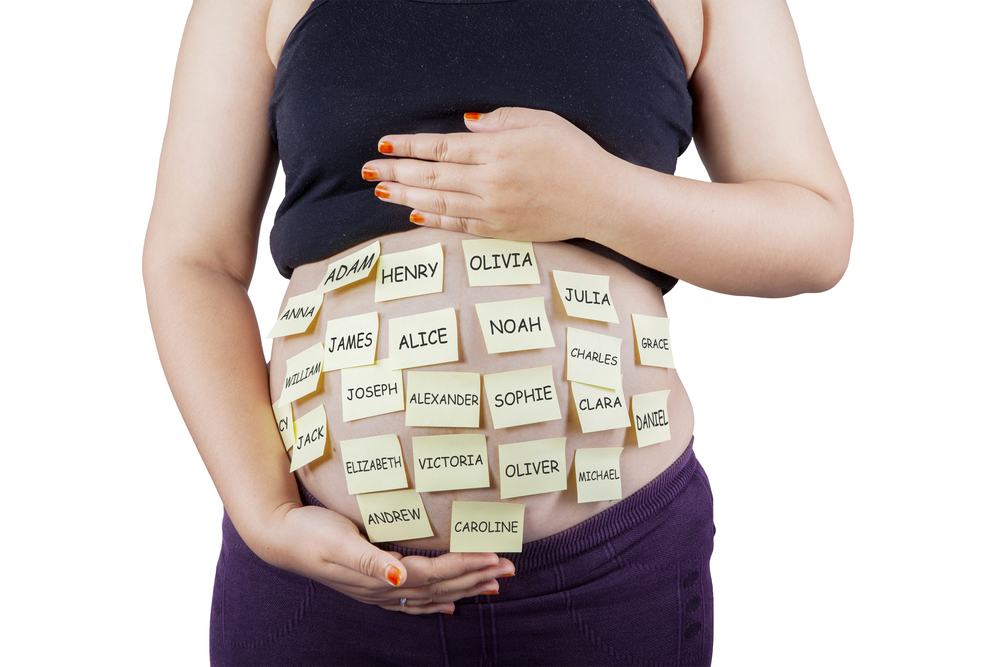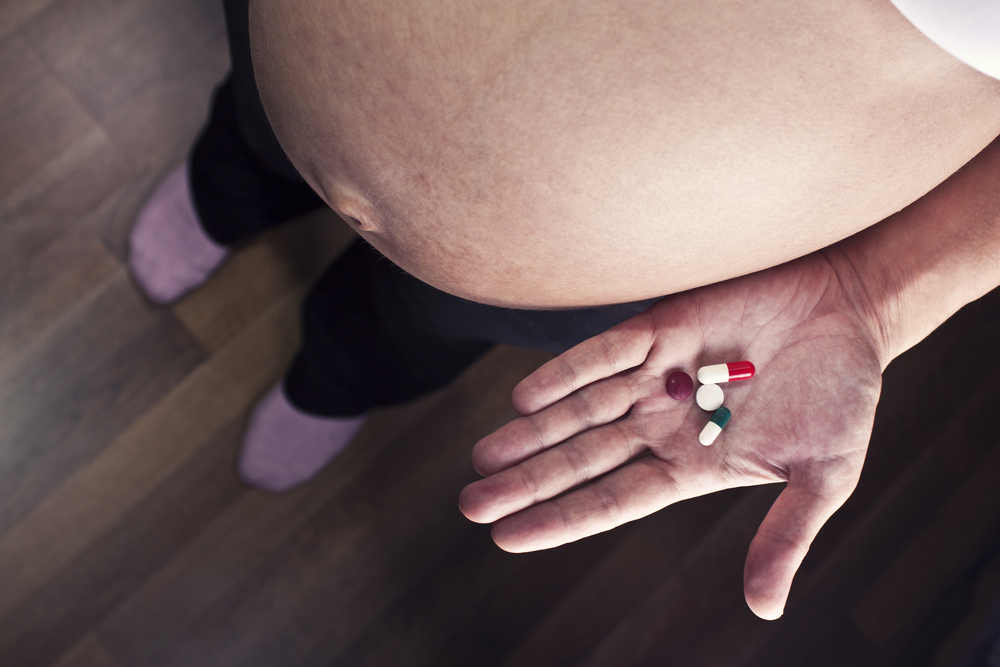
Nothing says hormonal roller coaster like the stereotype of a pregnant woman eating gherkins and ice-cream. Pregnancy is a time of intense emotional and physiological change and, in my case, largely revolved around a deep and meaningful relationship with potatoes and my sofa. Some of us glow, some of us just sweat a lot and feel queasy, but we all do our best to get through it.
However, empirical studies show that some 15-30% of women experience sufficiently high levels of depression, anxiety and stress during pregnancy to require treatment (Lee et al, 2007) and herein lies the problem: when you’re pregnant, one of things you have to get used to very quickly is advice – advice about what to eat, what to wear and, crucially, what to avoid.
Imagine the situation then, where you need psychological treatment which may involve taking medication, but the evidence around the benefits to yourself versus the risks to your baby of getting that treatment is somewhat murky.

Pregnancy is punctuated by a series of dilemmas and few are bigger than the choices faced by women affected by depression.
The problem
Maternity research is currently undergoing a considerable shift, away from the long-held focus on negative outcomes associated with postnatal depression. Antenatal and even pre-conception behaviours are increasingly in the spotlight and research consistently demonstrates that antenatal depression is independently associated with a significant increase in the risk of persistent behavioural, emotional and cognitive problems in the developing infant (Pearson et al, 2013).
Antenatal depression is a strong predictor of postnatal depression and both have been associated with negative obstetric and neonatal outcomes (as have drug treatments for antenatal depression). Some studies have associated exposure to SSRIs during pregnancy with increased risk of miscarriage, heart defects, premature birth and low birth weight. However, these risks must be weighed carefully against the risks associated with untreated maternal perinatal depression, which include prematurity and preeclampsia.
A new systematic review and meta-analysis from the US Agency for Healthcare Research and Quality (McDonagh et al, 2014) set out to evaluate the comparative benefits and harms (in both mother and child) of antidepressant treatment for depression in pregnant or postpartum women.

15-30% of women experience sufficiently high levels of depression, anxiety and stress during pregnancy to require treatment.
Methods
- Two reviewers independently selected English-language studies of pregnant women with depression comparing antidepressants with each other, placebo or no treatment, or nondrug treatments. Studies making comparisons among women taking antidepressants for any reason and those not taking antidepressants (depression status unknown) were used to fill gaps in the evidence
- Meta-analysis was undertaken using StatsDirect software when the studies were methodologically and clinically similar using random-effects models for three or more and fixed-effect models for two studies
Results
- Six RCTs and 15 observational studies provided direct evidence and 36 observational studies provided indirect evidence
- There was no direct evidence of harm to the mother of taking antidepressants during pregnancy
- Indirect evidence suggested a slight mean pregnancy weight gain
- Evidence for other outcomes was insufficient to draw conclusions
- Direct evidence of harm to children of women being treated for antenatal depression was limited
- Low-strength evidence suggested neonates of pregnant women with depression taking selective serotonin reuptake inhibitors had:
- Higher risk of respiratory distress than did neonates of untreated women (13.9% compared with 7.8%; P<.001; OR 1.91, 95% CI 1.63 to 2,24);
- But no difference in risk of neonatal convulsions (0.14% compared with 0.11%; P=.64);
- Or preterm birth (17% compared with 10%; P=.07)
- Exposure to SSRIs as a group did not result in increased risk of major malformations in neonates; however, evidence indicated small but significant risk with exposure to fluoxetine (pooled OR 1.14, 95% CI 1.01 to 1.30) or paroxetine (pooled OR 1.17, 95% CI 1.02 to 1.35)
- Indirect evidence from studies of pregnant women receiving antidepressants for mixed or unreported reasons compared with pregnant women not taking antidepressants (depression status unknown) suggested future research should focus on congenital anomalies and autism spectrum and attention deficit disorders (ADD) in the child
- In postpartum depression, low-strength and inconsistent evidence suggested symptom response was not improved when an SSRI was added to non-pharmacological treatments
- Evidence was insufficient for other outcomes, including depression symptoms, functional capacity, breastfeeding, and infant and child development

This review provides some useful detail, but the evidence remains inconclusive about the benefits and harms of antidepressants for depression in pregnancy.
Summary
One of the serious limitations of this study (as identified by the authors) is the lack of study populations of exclusively depressed pregnant and postpartum women. Quite simply, the evidence about the comparative benefits and harms of drug treatments for depression in pregnant and postpartum women remains inadequate to allow informed decisions about treatment, largely due to the methodological inconsistency of existing research.
It is important to note that the authors go on to underline the importance of taking a very much person-centred approach to future research in the field: it is only by determining the actual benefit-harm trade-offs made on a case-by-case basis that we will come to develop a solid evidence base to support decision making. Evidence-based alternatives to pharmacological treatment do exist (Clatworthy, 2012) and future work needs to take a holistic view in examining what works, when and for whom.
Current NICE guidelines stress the importance of treating antenatal depression and recommended routine screening as part of antenatal care; however, despite the fact that depression is common during pregnancy and may have adverse consequences for mother and baby, there is precious little evidence based on the experiences of women with antenatal depression or the optimum content and delivery of interventions.
This is intimately linked to the problem of detection (Goodman, 2010) and the unwillingness of many women to admit to feelings of depression as well as the paucity of services set up to detect and respond to perinatal depression. In a recent NHS Confederation briefing, some 41% of pregnant women reported that their midwife or health visitor never asked about depression and otherwise adequately trained health professionals said that they do not have time to explore mental wellbeing (NHS Confederation Mental Health Network, 2014).
Pregnancy is a time when women are vulnerable but also often highly motivated to address issues affecting their health. It is also a key time when the long-term wellbeing of the mother can be influenced. An antenatal intervention offers distinct advantages over treatment in the postnatal period and it is essential that any treatment (pharmacological, psychological or psychosocial) is delivered in a way that is acceptable to women during pregnancy, and is adapted to take account of the particular concerns of women at this time, such as stigma and making time to commit to therapy.
However, at the time of writing, midwives are set to strike for the first time in their history and this is devastating. Refused a 1% pay rise, they are at the coal face of an overloaded system which prioritises physical antenatal care, and which is focused almost exclusively on the health of the baby rather than that of the baby and mother. Alderdice et al highlight the vital strategic role of the midwife in promoting maternal mental health (Alderdice et al, 2013), but this role is groaning under its own weight.
Provision of adequate mental health services is an urgent public heath priority and requires nothing short of a philosophical rethink and systemic change.

Pregnant women who experience depression may find themselves facing difficult decisions about treatment options.
Links and further reading
McDonagh M, Matthews A, Phillipi C, Romm J, Peterson K, Thakurta S, Guise J-M. Antidepressant Treatment of Depression During Pregnancy and the Postpartum Period. (PDF). Evidence Report/Technology Assessment No. 216. (Prepared by the Pacific Northwest Evidence-based Practice Center under Contract No. 290-2007-10057-I.) AHRQ Publication No. 14-E003-EF. Rockville, MD: Agency for Healthcare Research and Quality; July 2014
Lee AM, Lam SK, Sze Mun Lau SM, Chong CS, Chui HW, Fong D. (2007). Prevalence, course and risk factors for antenatal anxiety and depression. Obstetrics and Gynecology 110, 1102–1112. [PubMed abstract]
Pearson RM, Evans J, Kounali D, Lewis G, Heron J, Ramchandani PG, O’Connor TG, Stein A. Maternal Depression During Pregnancy and the Postnatal Period: Risks and Possible Mechanisms for Offspring Depression at Age 18 Years. [PDF] JAMA Psychiatry, 2013 Oct 9.
Clatworthy J. (2012). The effectiveness of antenatal interventions to prevent postnatal depression in high-risk women. Journal of Affective Disorders, 137(1-3): 25-34. [PubMed abstract]
Goodman JH, Tyer-Viola L. (2010). Detection, treatment, and referral of perinatal depression and anxiety by obstetrical providers. Journal of Women’s Health (Larchmt). 2010 Mar;19(3):477-90. [PubMed abstract]
A good start in life: Improving perinatal and maternal mental health provision (PDF). NHS Confederation Mental Health Network, Briefing, June 2014, Issue 272.
Alderdice F, McNeill J, Lynn F. A systematic review of systematic reviews of interventions to improve maternal mental health and well-being. Midwifery. 2013 Apr;29(4):389-99. [PubMed abstract]


RT @Mental_Elf: Antidepressants for depression in pregnancy: new systematic review says the jury’s still out http://t.co/NQpSJW0oQO
Antidepressants for depression in pregnancy: new systematic review says the jury’s still out: Nikki Newhouse s… http://t.co/oD1i9jdvem
Antidepressants for depression in pregnancy: an important decision that needs careful consideration http://t.co/l8wRRZXKkm via @sharethis
#Antidepressants for depression in #pregnancy: new systematic review says the jury’s still out http://t.co/ntU440HigH
Today @nikkinewhouse on antidepressants for depression during pregnancy and the postpartum period http://t.co/thCMrXNfq1
@Mental_Elf @nikkinewhouse Great summary, thank you
The Mental Elf liked this on Facebook.
excellent @Mental_Elf blog post about antidepressants in pregnancy from @nikkinewhouse http://t.co/XUPIs5VKA4
RT @Mental_Elf: 15-30% of women experience sufficiently high levels of depression, anxiety & stress whilst pregnant to need treatment http:…
“@Mental_Elf:15-30% of pregnant women experience depression, anxiety & stress and need treatment http://t.co/U5BsVqIsZq” #healthvisiting
US review finds evidence remains inconclusive about benefits & harms of antidepressants for depression in pregnancy http://t.co/thCMrXNfq1
Be cautious during pregnancy- psychotherapy not meds except for severe depression
http://t.co/fxTZBA6lx9
@Mental_Elf
@AllenFrancesMD @Mental_Elf
Modern Psychotherapy (Not Psych) handles al Psychosomatic Illness
http://t.co/tKFYPiliCJ
http://t.co/fHT331UbCv
#Antidepressants for #depression in #pregnancy: new systematic review says the jury’s still out http://t.co/oTOiqj3B2q
Mental Elf: Antidepressants for depression in pregnancy: new systematic review says the jury’s still out http://t.co/cK2o8BEGEH
@Mental_Elf @BPSOfficial
June Dunnett liked this on Facebook.
Read this thoughtful exploration of the dilemmas facing pregnant women with depression by @nikkinewhouse http://t.co/thCMrXNfq1
Don’t miss – Antidepressants for depression in pregnancy: new systematic review says the jury’s still out http://t.co/thCMrXNfq1 #EBP
@Mental_Elf thanks for this. 19 weeks pregnant taking venlafaxine. Hoping to reduce in 3rd trimester. Mood balancing on a knife edge.
Do you know that 15 – 30% of #pregnant #women suffer from #depression that requires treatment? http://t.co/gHvWjei66Q via @Mental_Elf
[…] http://www.thementalelf.net/mental-health-conditions/depression/antidepressants-for-depression-in-pr… […]
Our blog on #antidepressants for #depression in #pregnancy seems very relevant again today http://t.co/thCMrXNfq1 It’s #everyonesbusiness
Antidepressants for depression in pregnancy: new systematic review says the jury’s still out http://t.co/BUiDlM8Wer via @Mental_Elf
[…] Antidepressants for depression in pregnancy: new systematic review says the jury’s still out […]
[…] Antidepressants for depression in pregnancy: new systematic review says the jury’s still out […]